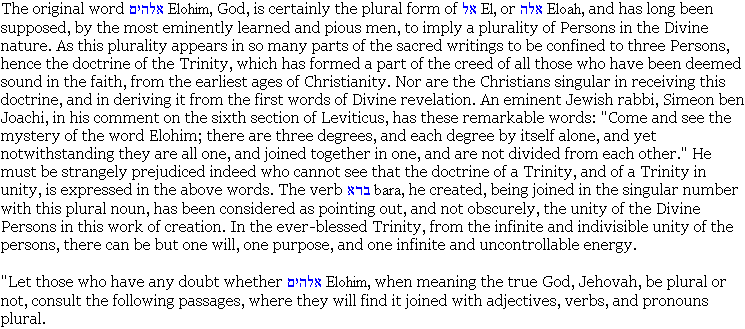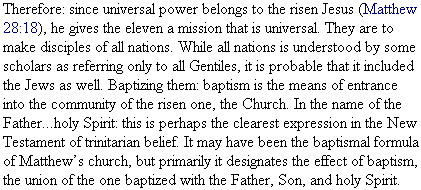
In the course of the past several years the statement has been made that Christians "stole" the idea of the Trinity. Instead of reinventing the wheel, here are some thoughts of those who have preceded us.

"
Gen_1:26 Gen_3:22 Gen_11:7 Gen_20:13 Gen_31:7, Gen_31:53 Gen_35:7. "Deu_4:7 Deu_5:23; Jos_24:19 1Sa_4:8; 2Sa_7:23; "Psa_58:6; Isa_6:8; Jer_10:10, Jer_23:36. "See also Pro_9:10, Pro_30:3; Psa_149:2; Ecc_5:7, Ecc_12:1; Job_5:1; Isa_6:3, Isa_54:5, Isa_62:5; Hos_11:12, or Hos_12:1; Mal_1:6; Dan_5:18, Dan_5:20, and Dan_7:18, Dan_7:22." - Parkhurst.Adam Clarke, LL.D., F.S.A., (1715-1832), Adam Clarke's Commentary on the Bible
The question of whether or not the concept of the Trinity or suggestion of God as Triune is in fact in the Bible is valid. So far there is one witness to the concept of the Triune God, taking contextual and grammatical evidence as a whole along with the deductions of the rabbi cited above. He is not alone among other Jews. In fact there is specific evidence that is more obvious than the testimony of those who only consider the TaNaK as sacred scripture. The several citations comprise more than the three required witnesses to testify to the truthfulness of the factual state of a matter.
The Christophanies that occur in the Old Testament establish the known presence of Jesus as the LORD Sabaoth as He is referred to in the New Testament. Therefore the presence of God the Father, God the Son, and God the Holy Spirit are referred to many times. For a fuller treatment of this aspect of the revelation of Jesus, follow this link to Christophany.
He said: They are indeed my people,
children who are not disloyal;
So he became their savior
in their every affliction.
It was not a messenger or an angel,
but he himself who saved them.
Because of his love and pity
he redeemed them himself,
Lifting them and carrying them
all the days of old.
But they rebelled, and grieved
his holy spirit;
So he turned on them like an enemy,
and fought against them.
Isaiah 63:8-10
"The Angel of His Presence" occurs here in parallel to pronouns referring to God Himself. This is the Angel of the Lord who acted on Israel’s behalf at the Exodus and other times and is considered to have been the preincarnate Christ (cf. Genesis 18:2, note; Exodus 14:19; 23:20–23; Joshua 5:13–15, note; Judges 13:18, note). Verses 8–10 refer to God as Father (v. 8), "Angel" (v. 9), and "Holy Spirit" (v. 10), a hint of the triune nature of God more fully presented in the New Testament (cf. Luke 3:22).
The first citation selected has the witness of the Prophet Isaiah who related in written record the testimony of the Father from the Holy Spirit about the Son. It also happens that this is a prophecy fulfilled by Jesus. No one in all of recorded history has fulfilled this prophecy except Jesus.
Here is my servant whom I uphold,
my chosen one with whom I am pleased,
Upon whom I have put my spirit;
he shall bring forth justice to the nations,
Not crying out, not shouting,
not making his voice heard in the street.
A bruised reed he shall not break,
and a smoldering wick he shall not quench,
Until he establishes justice on the earth;
the coastlands will wait for his teaching.
Isaiah 42:1-4
Come ye near unto me, hear ye this; I have not spoken in secret from the beginning; from the time that it was, there am I: and now the Lord GOD, and his Spirit, hath sent me.
Isaiah 48:16
This is obviously Jesus speaking as He was with the Father and the Holy Spirit at the beginning.
After Jesus was baptized, he came up from the water and behold, the heavens were opened (for him), and he saw the Spirit of God descending like a dove (and) coming upon him.
And a voice came from the heavens, saying, "This is my beloved Son, with whom I am well pleased."
Matthew 3:16-17
When they saw him, they worshiped, but they doubted.
Then Jesus approached and said to them, "All power in heaven and on earth has been given to me.
Go, therefore, and make disciples of all nations, baptizing them in the name of the Father, and of the Son, and of the holy Spirit,
teaching them to observe all that I have commanded you. And behold, I am with you always, until the end of the age."
Matthew 28:17-20


and the holy Spirit descended upon him in bodily form like a dove. And a voice came from heaven, "You are my beloved Son; with you I am well pleased."
Luke 3:22
Luke here indicates how the Holy Spirit becomes visible to both Jesus and John (Matthew 3:16; John 1:32). The import of this event is crucial in theology. This verse denies modalism, the heresy which construed the unity of God to be manifested in three different, momentary forms—Father, Son and Holy Spirit. The idea of God appearing sometimes as one and then as the other is proved to be unscriptural. Here there is simultaneously the appearance of Son and Holy Spirit. At the same time the voice of the Father is heard. Clearly, God is the triune God, eternally Father, Son and Holy Spirit (cf. I Peter 1:2). Luke quotes from Psalm 2:7 and Isaiah 42:1, which identify Jesus as the Son of God and the Suffering Servant. All three Persons of the Triunity are here together for the first time in the Gospel.
W. A. Criswell, Believer’s Study Bible [computer file], electronic ed. , Logos Library System, (Nashville: Thomas Nelson) 1997, ©1991 by the Criswell Center for Biblical Studies.
In the first book, Theophilus, I dealt with all that Jesus did and taught
until the day he was taken up, after giving instructions through the holy Spirit to the apostles whom he had chosen.
He presented himself alive to them by many proofs after he had suffered, appearing to them during forty days and speaking about the kingdom of God.
While meeting with them, he enjoined them not to depart from Jerusalem, but to wait for "the promise of the Father about which you have heard me speak;
for John baptized with water, but in a few days you will be baptized with the holy Spirit."
Acts 1:1-5
3
Blessed be the God and Father of our Lord Jesus Christ, who has blessed us in Christ with every spiritual blessing in the heavens,4
as he chose us in him, before the foundation of the world, to be holy and without blemish before him. In love5
he destined us for adoption to himself through Jesus Christ, in accord with the favor of his will,6
for the praise of the glory of his grace that he granted us in the beloved.7
In him we have redemption by his blood, the forgiveness of transgressions, in accord with the riches of his grace8
that he lavished upon us. In all wisdom and insight,9
he has made known to us the mystery of his will in accord with his favor that he set forth in him10
as a plan for the fullness of times, to sum up all things in Christ, in heaven and on earth.11
In him we were also chosen, destined in accord with the purpose of the one who accomplishes all things according to the intention of his will,12
so that we might exist for the praise of his glory, we who first hoped in Christ.13
In him you also, who have heard the word of truth, the gospel of your salvation, and have believed in him, were sealed with the promised holy Spirit,14
which is the first installment of our inheritance toward redemption as God’s possession, to the praise of his glory.Ephesians 1:3-14
These verses are one complete sentence in Greek, functioning as a beautiful doxology to the triune God for the marvelous salvation He has provided.
W. A. Criswell, Believer’s Study Bible [computer file], electronic ed. , Logos Library System, (Nashville: Thomas Nelson) 1997, ©1991 by the Criswell Center for Biblical Studies.
...with all humility and gentleness, with patience, bearing with one another through love,
striving to preserve the unity of the spirit through the bond of peace:
one body and
one Spirit,
as you were also called to the one hope of your call;
one Lord, one faith, one baptism;
one God and Father of all, who is over all and through all and in all.
Ephesians 4:2-6
But when the kindness and generous love
of God our savior appeared,
not because of any righteous deeds we had done
but because of his mercy,
he saved us through the bath of rebirth
and renewal by the holy Spirit,
whom he richly poured out on us
through Jesus Christ our savior,
so that we might be justified by his grace
and become heirs in hope of eternal life.
Titus 3:4-7
GODHEAD
— an old English term that is a synonym for God, with an emphasis on that which makes the triune God essentially one (Romans 1:20; Colossians 2:9). The apostle Paul used the term to show the contrast between God’s sinless nature and the corrupt character of human beings and their tendencies toward idolatry.In Romans 1:20 Paul used the term Godhead to describe what mankind ought to see in nature as a result of God’s creative handiwork—"His eternal power and Godhead," or "Deity." This entire passage in Romans describes how the human mind fails to understand the exalted Godhead because of its sinful rebellion and distortion of truth.
In the Colossians passage Paul declared that in Christ "dwells all the fullness of the Godhead bodily" (Colossians 2:9), in contrast to the "tradition of men" (Colossians 2:8). In the Son of God who took on human form, the essential quality and character of God are wholly present. This was Paul’s way of emphasizing that Jesus is not a mere "divine man" like the heroes of the Greco-Roman world, but truly God—the Godhead or God Himself in human form.
Ronald F. Youngblood, general editor; F.F. Bruce and R.K. Harrison, consulting editors, Nelson’s New Illustrated Bible Dictionary: An authoritative one-volume reference work on the Bible with full color illustrations [computer file], electronic edition of the revised edition of Nelson’s illustrated Bible dictionary, Logos Library System, (Nashville: Thomas Nelson) 1997, ©1995.
All Bible verses are from the NAB unless otherwise indicated.
The Holy Bible, The New American Bible, (Nashville, Tennessee: Confraternity of Christian Doctrine) 1997.